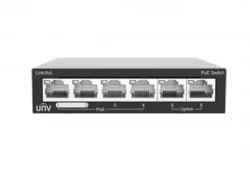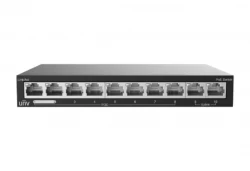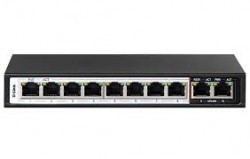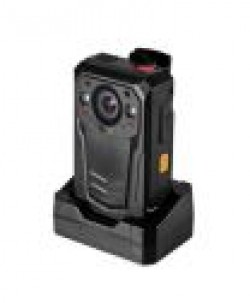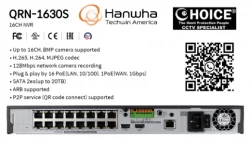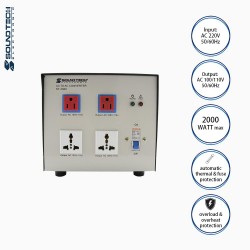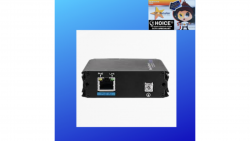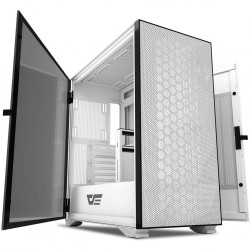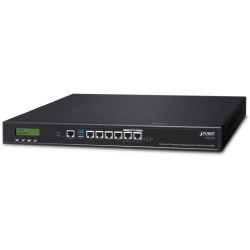CHOICE DSN07-F Compact Design Peripheral Connectivity
 CHOICECYCLE
CHOICECYCLE
Address:
1 Rochor Canal Road, #02-81 Sim Lim Square 188504
Singapore.
9853 4404
enquiry@choicecycle.com.sg
Frequently bought together:
CHOICE DSN07-F Compact Design Peripheral Connectivity Multi-Port Connectivity Productivity Enhancement Cost-Effectiveness
Features:
Rack-Mountable Design: Typically designed to be mounted in standard server racks, allowing for efficient use of space in data centers.
High Storage Capacity: Offers large storage capacity with support for multiple hard drives or solid-state drives (SSDs), allowing for the storage of vast amounts of data.
Redundancy and Scalability: Often equipped with features such as RAID (Redundant Array of Independent Disks) for data redundancy and scalability, ensuring data availability and integrity.
High-Speed Connectivity: Includes multiple network interfaces such as Ethernet, Fibre Channel, or InfiniBand for high-speed data transfer between servers and storage devices.
Management and Monitoring: Provides management tools and interfaces for configuring, monitoring, and managing storage resources, including storage allocation, performance monitoring, and data replication.
Data Protection Features: Incorporates features such as data encryption, access control, and backup solutions to ensure data security and integrity.
Scalable Architecture: Designed with a modular and scalable architecture, allowing for easy expansion of storage capacity and performance as the organization's data needs grow.
Functions:
Data Storage: Primarily serves as a centralized storage repository for storing and managing data, including files, databases, virtual machine images, and other digital assets.
Data Management: Facilitates data organization, retrieval, and manipulation through features such as file systems, data deduplication, and data compression.
Data Backup and Recovery: Provides backup and recovery solutions for protecting against data loss and ensuring business continuity in the event of hardware failures, disasters, or other unforeseen events.
Data Sharing and Collaboration: Enables multiple users or applications to access and share data stored on the server, facilitating collaboration and data sharing within the organization.
Data Replication and Synchronization: Supports data replication and synchronization across multiple storage servers or data centers to ensure data availability, disaster recovery, and business continuity.
Storage Virtualization: Offers storage virtualization capabilities, allowing administrators to pool and abstract physical storage resources for more efficient utilization and management.
Performance Optimization: Includes features such as caching, tiering, and optimization algorithms to optimize storage performance and improve application responsiveness.
Benefits/Advantages:
Scalability: Allows organizations to scale storage capacity and performance to meet growing data demands without significant disruptions or downtime.
Data Integrity: Ensures data integrity and availability through redundancy, backup, and disaster recovery mechanisms, minimizing the risk of data loss or corruption.
Cost-Effectiveness: Provides a cost-effective solution for storing and managing large volumes of data compared to traditional storage methods, such as direct-attached storage (DAS).
Centralized Management: Simplifies storage management and administration through centralized management interfaces and tools, reducing administrative overhead and complexity.
High Availability: Offers high availability features such as failover, clustering, and replication, ensuring continuous access to data and applications even in the event of hardware failures or disruptions.
Data Security: Enhances data security through features such as encryption, access controls, and audit trails, helping organizations comply with regulatory requirements and protect sensitive information.
Overall, a box-type storage server provides organizations with a reliable and scalable storage infrastructure for storing, managing, and protecting their valuable data assets, enabling them to meet their evolving storage needs and business requirements effectively.
CHOICE DSN07-F Compact Design Peripheral Connectivity Multi-Port Connectivity Productivity Enhancement Cost-Effectiveness
The potential users of a box-type storage server, also known as a rack-mount storage server, include a wide range of organizations and industries that require centralized storage solutions for managing large volumes of data. Here are some potential users:
Enterprises: Large corporations and businesses across various industries, including finance, healthcare, manufacturing, retail, and telecommunications, may utilize box-type storage servers to store and manage their critical business data, applications, and digital assets.
Data Centers: Data centers, both enterprise-owned and colocation facilities, rely on storage servers to provide scalable and reliable storage infrastructure for hosting and managing data-intensive applications, cloud services, and virtualized environments.
Educational Institutions: Colleges, universities, and research institutions use storage servers to store and manage academic and research data, digital libraries, multimedia content, and student records.
Government Agencies: Government agencies at the federal, state, and local levels require storage servers to store and manage sensitive government data, including citizen records, administrative documents, and law enforcement data.
Healthcare Organizations: Hospitals, clinics, and healthcare providers utilize storage servers to store and manage electronic health records (EHRs), medical imaging data (e.g., X-rays, MRI scans), and other healthcare-related information securely and compliantly.
Media and Entertainment Companies: Media production companies, broadcasting networks, and streaming platforms rely on storage servers to store and manage large volumes of digital media content, including videos, audio files, and graphics.
Financial Institutions: Banks, insurance companies, and financial services firms utilize storage servers to store and manage financial transactions, customer records, regulatory documents, and other sensitive financial data.
Research Organizations: Scientific research institutions, laboratories, and engineering firms use storage servers to store and manage research data, simulations, and scientific computing workloads.
Retail and E-commerce Businesses: Retailers and e-commerce companies leverage storage servers to store and manage product catalogs, inventory data, customer transactions, and sales analytics.
Legal Firms: Law firms and legal departments use storage servers to store and manage case files, legal documents, contracts, and other legal records securely and efficiently.
In summary, the potential users of box-type storage servers span various sectors and industries, all of which require reliable, scalable, and high-performance storage infrastructure to meet their data storage, management, and retrieval needs effectively.
CHOICE DSN07-F Compact Design Peripheral Connectivity Multi-Port Connectivity Productivity Enhancement Cost-Effectiveness
Technical Details:
| Brand: | CHOICE |
|---|---|
| Model number: | DSN07-F |
| Part Number: | 06345572366683 |
| Seller SKU: | CC81DSN07-F |
| Origin: | Singapore |
| Minimum order quantity: | 1 |
| Date first listed on Sim Lim Square: | Apr 19, 2024 |
CHOICE DSN07-F Compact Design Peripheral Connectivity Multi-Port Connectivity Productivity Enhancement Cost-Effectiveness
Features:
Rack-Mountable Design: Typically designed to be mounted in standard server racks, allowing for efficient use of space in data centers.
High Storage Capacity: Offers large storage capacity with support for multiple hard drives or solid-state drives (SSDs), allowing for the storage of vast amounts of data.
Redundancy and Scalability: Often equipped with features such as RAID (Redundant Array of Independent Disks) for data redundancy and scalability, ensuring data availability and integrity.
High-Speed Connectivity: Includes multiple network interfaces such as Ethernet, Fibre Channel, or InfiniBand for high-speed data transfer between servers and storage devices.
Management and Monitoring: Provides management tools and interfaces for configuring, monitoring, and managing storage resources, including storage allocation, performance monitoring, and data replication.
Data Protection Features: Incorporates features such as data encryption, access control, and backup solutions to ensure data security and integrity.
Scalable Architecture: Designed with a modular and scalable architecture, allowing for easy expansion of storage capacity and performance as the organization's data needs grow.
Functions:
Data Storage: Primarily serves as a centralized storage repository for storing and managing data, including files, databases, virtual machine images, and other digital assets.
Data Management: Facilitates data organization, retrieval, and manipulation through features such as file systems, data deduplication, and data compression.
Data Backup and Recovery: Provides backup and recovery solutions for protecting against data loss and ensuring business continuity in the event of hardware failures, disasters, or other unforeseen events.
Data Sharing and Collaboration: Enables multiple users or applications to access and share data stored on the server, facilitating collaboration and data sharing within the organization.
Data Replication and Synchronization: Supports data replication and synchronization across multiple storage servers or data centers to ensure data availability, disaster recovery, and business continuity.
Storage Virtualization: Offers storage virtualization capabilities, allowing administrators to pool and abstract physical storage resources for more efficient utilization and management.
Performance Optimization: Includes features such as caching, tiering, and optimization algorithms to optimize storage performance and improve application responsiveness.
Benefits/Advantages:
Scalability: Allows organizations to scale storage capacity and performance to meet growing data demands without significant disruptions or downtime.
Data Integrity: Ensures data integrity and availability through redundancy, backup, and disaster recovery mechanisms, minimizing the risk of data loss or corruption.
Cost-Effectiveness: Provides a cost-effective solution for storing and managing large volumes of data compared to traditional storage methods, such as direct-attached storage (DAS).
Centralized Management: Simplifies storage management and administration through centralized management interfaces and tools, reducing administrative overhead and complexity.
High Availability: Offers high availability features such as failover, clustering, and replication, ensuring continuous access to data and applications even in the event of hardware failures or disruptions.
Data Security: Enhances data security through features such as encryption, access controls, and audit trails, helping organizations comply with regulatory requirements and protect sensitive information.
Overall, a box-type storage server provides organizations with a reliable and scalable storage infrastructure for storing, managing, and protecting their valuable data assets, enabling them to meet their evolving storage needs and business requirements effectively.
CHOICE DSN07-F Compact Design Peripheral Connectivity Multi-Port Connectivity Productivity Enhancement Cost-Effectiveness
The potential users of a box-type storage server, also known as a rack-mount storage server, include a wide range of organizations and industries that require centralized storage solutions for managing large volumes of data. Here are some potential users:
Enterprises: Large corporations and businesses across various industries, including finance, healthcare, manufacturing, retail, and telecommunications, may utilize box-type storage servers to store and manage their critical business data, applications, and digital assets.
Data Centers: Data centers, both enterprise-owned and colocation facilities, rely on storage servers to provide scalable and reliable storage infrastructure for hosting and managing data-intensive applications, cloud services, and virtualized environments.
Educational Institutions: Colleges, universities, and research institutions use storage servers to store and manage academic and research data, digital libraries, multimedia content, and student records.
Government Agencies: Government agencies at the federal, state, and local levels require storage servers to store and manage sensitive government data, including citizen records, administrative documents, and law enforcement data.
Healthcare Organizations: Hospitals, clinics, and healthcare providers utilize storage servers to store and manage electronic health records (EHRs), medical imaging data (e.g., X-rays, MRI scans), and other healthcare-related information securely and compliantly.
Media and Entertainment Companies: Media production companies, broadcasting networks, and streaming platforms rely on storage servers to store and manage large volumes of digital media content, including videos, audio files, and graphics.
Financial Institutions: Banks, insurance companies, and financial services firms utilize storage servers to store and manage financial transactions, customer records, regulatory documents, and other sensitive financial data.
Research Organizations: Scientific research institutions, laboratories, and engineering firms use storage servers to store and manage research data, simulations, and scientific computing workloads.
Retail and E-commerce Businesses: Retailers and e-commerce companies leverage storage servers to store and manage product catalogs, inventory data, customer transactions, and sales analytics.
Legal Firms: Law firms and legal departments use storage servers to store and manage case files, legal documents, contracts, and other legal records securely and efficiently.
In summary, the potential users of box-type storage servers span various sectors and industries, all of which require reliable, scalable, and high-performance storage infrastructure to meet their data storage, management, and retrieval needs effectively.
CHOICE DSN07-F Compact Design Peripheral Connectivity Multi-Port Connectivity Productivity Enhancement Cost-Effectiveness
Return and Refund Policy:
Same Packing, Unused within 14 days - Repair, Replace, Return & Refundable.
No reviews
Related Items












